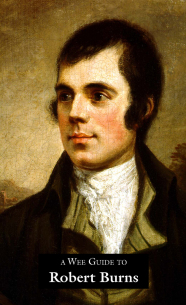Robert Burns 1784-86: The Ploughman Poet
O leave novéls, ye Mauchline belles
Ye’re safer at your spinning-wheel;
Such witching books are baited hooks
For rakish rooks like Rob Mossgiel.
A few weeks after his father’s death, Robert and his brother Gilbert took over the lease of a 100-acre farm called Mossgiel in Mauchline parish. The rent was £90 a year and Robert was full of enthusiasm for the new venture – ‘I read farming books; I calculated crops; I attended markets....’ There was a three-roomed cottage for the family, and the young householder was known locally as Rob Mossgiel.
Symbolic of his new life was a subtle change of name, for it is from the time of his father’s death that Rob formally changed the spelling of his name from Burnes to Burns. All his life, he loved the capacity to invent and re-invent himself through words.
Other changes became apparent. Free from his father’s restraining influence, Robert’s relationships with women rapidly became the tangled web they would remain for the rest of his life. A local girl, Lizzie Paton, was pregnant by him and Rob had no intention whatsoever of marrying her – fortunately for him, his brother Gilbert also felt that Lizzie was no suitable match for a Burns.
Lizzie Paton’s child was brought up in the Burns household. A characteristic of Burns – by no means usual in those days, or now – which does him credit was his willingness not only to acknowledge his various illegitimate children and accept financial responsibility for them, but an apparent preference for taking these children into his own home. Of his 14 acknowledged children, only five were actually born in wedlock.
Lizzie left the scene and Rob wrote a poem ‘Welcome to his Bastard Wean’ – clearly a fully-fledged artist already in his ability to use personal experience for public entertainment. The poem is usually published under the more genteel title of ‘A Poet’s Welcome to his Love-Begotten Daughter’ and it gives a wry insight into the man:
Tho’ now they ca’ me fornicator
An’ tease my name in countra clatter
The mair they talk, I’m kend the better,
E’en let them clash;
An auld wife’s tongue’s a’ feckless matter
To gie ane fash.
Contempt for village chatter does not disguise a certain braggadocio concerning his own sexual prowess, and this is surely tongue-in-cheek:
Lord grant that thou may aye inherit
Thy mither’s person, grace, an’ merit,
An thy poor, worthless daddy’s spirit
Without his failins ...
But for all the public grief this birth may have given him, there is no hint of it in what is overwhelmingly a poem of proud paternity:
Welcome! my bonie, sweet, wee dochter
Tho’ ye come here a wee unsought for
And tho’ your comin’ I hae fought for
Baith kirk and queir;
Yet by my faith ye’re no unwrought for,
That I shall swear!
Sweet fruit o’ monie a merry dint,
My funny toil is no a’tint,
Tho’ thou cam to the warl’ asklent,
Which fools may scoff at;
In my last plack thy part’s be in’t
The better ha’f o’t.
The urge to write was powerful and Rob was doing more and more of it – with some guilt. He was a farmer, and had every intention of being a successful one. Verse-making was a distraction from the real business of life – but he had to do it. He carried pen and paper with him everywhere, and the collection of poems, shoved into a drawer in an upstairs room, started to grow. His brother Gilbert noted that holding the plough was a favourite situation with Robert for poetic composition.
For recreation, in nearby Mauchline, there was Poosie Nansie’s Inn – an establishment as racy as its name suggests and the setting of ‘The Jolly Beggars’. In this and other taverns, Burns observed, noted, scribbled – and enjoyed. ‘Freedom and whisky gang together’, he once wrote. His passion was for the fellowship of drink – he loved its companionate nature, the jollity, the stimulation. He was usually a moderate drinker – his weak stomach and poor health saw to that – and seldom arrived at the maudlin, sorrows-drowning edge of drink, although there are recorded episodes when he and his companions became what he referred to as bitchified. His biographer Catherine Carswell notes that Burns was ‘never too drunk to write a letter’.
He was now also free to indulge his love of song. His own singing talents may have been minimal – though he was a fiddle player – but he had a superb ear. He only had to hear a ballad once to have its tune and its lyrics imprinted on his memory. For the rest of his life, Rob was to see himself as a ‘mender’ of old songs as well as a composer of new ones. Scotland’s rich heritage of folk song was threatened with disappearance: as people moved to cities and tastes changed, as poverty-stricken Scots fled to the New World, as the kirk maintained its implacable disapproval of song and dance – regarding mixed dancing between men and women as promiscuous – the old songs sung by the fire and in the fields were fading from memory. Burns set himself the task of recording as much as he could, and mending these old songs with the polish of his craft. The distinction between old and new songs is somewhat blurred: in those days, ‘culture’ did not have to be old, and as Burns’ fame grew, his songs became culture before the ink was dry.
It is significant that while he hoped to make money from his poems, he never took payment for his songs. Throughout the six volumes of the Scots Musical Museum – published collections of Scottish songs – he edited from 1787 and to which he was the principal contributor, he took only £10: an initial £5, and a further £5 when, on his deathbed, he wrote a letter to his collaborator George Thomson begging for help with a tailor’s bill.
Despite its dusty title, the Musical Museum did not mean a storehouse of the old. ‘Museum’ literally meant the home of the Muses, the nine patrons of the arts from Greek mythology.
In the autumn of 1784 Rob was called to the kirk to face public condemnation for Lizzie Paton’s condition. On this occasion, he was not required to sit upon the ‘creepie stool’ – the three-legged stool retained for the public display of sinners. At the end of the sermon, however, he had to stand up and be harangued by the Minister for the sin of ‘houghmagandie’ – fornication. The sinner would sometimes answer back: it is recorded that Rob remained silent.
At about this time, Rob met one Jean Armour, a Mauchline lass of good family, whose father was a master-mason. The story of their first meeting is charming – and has no basis in fact. During Race Week in April 1784, Rob had gone to a local dance. As ever, his faithful dog – there always was one – trotted at his heels. The dog, however, got in the way of the dancers and Rob sent him off home with the remark: ‘I wish I could find a lass that would love me as well as my dog’ – a line, of course, quite calculated to excite any lass that cared to pick up the challenge. Jean Armour did. A few days later, walking through Mauchline, Rob heard the saucy remark: ‘Well, Mossgiel, have you gotten any lass yet to love you as well as your dog?’
Jean was not then – indeed ever – the only romantic interest in Rob’s life and the Armours were frankly appalled at the blithe and forward way in which their daughter seemed to pursue this worthless young man – not only was he an unsuccessful farmer and the father of a bastard, a man who had already faced public
humiliation in the kirk but worse, he was beginning to be known locally as Rob the Rhymer. Parental indignation was unconfined.
The farm at Mossgiel had been a bitter disappointment. In the first year, the unlucky purchase of bad seed was to blame; in the second year, a late harvest.
At about this time, Rob became fascinated with the prospect of emigration to Jamaica. The reasons may have been many – Mossgiel was not the runaway success he’d hoped, he chafed against the petty restrictions of kirk morality, the complications of his personal life seemed a burden and would become more so – though it is equally likely that at first Jamaica simply appealed for all the reasons people always seek escape: freedom, adventure, money.
But the Jamaica trip had to be financed somehow, and so grew the idea of publishing, on subscription, a volume of his poems.
Early in 1786, Jean Armour had become pregnant: Mr Armour, it is recorded, swooned away at the worst news he could imagine. Pregnancy outside wedlock was as common in eighteenth-century Scotland as elsewhere: indeed, in farming communities it made practical sense to ensure a bride’s fertility before committing to marriage. Scots law conveniently bestowed retroactive legitimacy on children born before their parents’ marriage.
Jean Armour was not unusual in her unmarried pregnant state: but her parents had decent hopes for her, and a bankrupt poet was not among them. Moreover, Jean produced a document for their approval: a paper willingly signed by Rob which under Scots law constituted a marriage document. One can imagine the state of Mr Armour’s blood pressure as Jean was packed off to relatives in Paisley.
Parental anger and her own vulnerable condition probably combined to make the beleaguered Jean ‘confess’ to Mauchline Kirk and ‘repent’ her sins. She handed the marriage document over to her parents who defaced it so as to remove its legal status.
Rob interpreted her behaviour as rejection and desertion, and turned against her with something very like venom. This stage of their relationship is marked by vivid dramas of renunciation and grand gestures. Burns adopted an attitude – and then came to believe in it absolutely.
Typically, he regarded the whole sorry business as entirely Jean’s fault and sought to justify his own actions. When she did return to Mauchline, he wrote to a friend:
‘Poor, ill-advised, ungrateful Armour came home on Friday last ... what she thinks of her conduct I don’t know; one thing I know, she has made me completely miserable. Never man loved a woman more than I did her; and, to confess a truth ... I still do love her. It is not the losing her that makes me unhappy, but for her sake I feel most severely ... May God forgive her ingratitude and perjury to me. Sanctimoniously he recorded that I foresee that she is on the road to eternal ruin.’
Burns appears to have been so absorbed by his own emotions and feelings, to the exclusion of other people’s sense of reality, that he would react with surprise when anyone else displayed a positive reaction to anything he said or did. That summer of 1786 Burns thundered: ‘Against two things I am as fixed as fate; staying at home [that is, Mossgiel] and owning her conjugally. The first, by Heaven, I will not do! The last, by Hell, I will never do!’ Eventually, of course, he did both.
In that same summer of 1786, however, Rob was telling a friend that yet another woman – quite possibly ‘Highland Mary’ – was pregnant by him, while Jean, it seemed, was carrying twins. Her father was implacable in his hatred of Rob. The farm was definitely a failure. Suddenly, a Jamaica-bound ship must have seemed overwhelmingly attractive.
The enigmatic figure of Highland Mary glows from a dark corner of Burns’ life and has remained a powerful part of the legend. The known facts are few. Margaret Campbell originally came from Dunoon, in Argyll, and had arrived in Mauchline to work as a nursemaid in the home of Burns’ friend and benefactor, Gavin Hamilton. She is described as tall and fair-haired, with blue eyes and a pleasant and winning manner.
Burns had been writing to a friend – concerning Jean’s ‘desertion’ – that he was ‘wiping away the grief-worn eye ... to look for another wife’. Burns’ own recollection of their affair is not to be relied on in detail but probably in emotion:
‘My Highland lassie was a warm-hearted, charming young creature as ever blessed a man with generous love’.
His song, ‘The Highland Lassie O’, was written for her.
In May 1786 Mary went to stay with relatives in Greenock, and Burns gave her a two-volume Bible as a parting gift. The inscription inside, in Rob’s bold hand, urged fidelity, and this exchange of Bibles has been interpreted by some as a sort of marriage contract. He seems to have planned to take Mary with him to Jamaica, where they would start a new life together: why then did Mary leave Mauchline and return to Greenock? Officially, it was to prepare for her trip. In October, however, Burns received an anonymous letter from Greenock telling him that Mary was dead.
Mystery surrounds the cause of her death. Her family thereafter displayed implacable hostility to Burns and it is likely they destroyed his letters to Mary, but with good business sense, they held on to the Bibles which were ultimately sold for a satisfactory sum of money.
Mary was buried in Greenock, and in 1803 the Greenock Burns Club noted a resolution to erect a stone in her memory. In 1920, however, the graveyard was cleared for building and Mary Campbell’s grave opened. Among the remains was found part of a child’s coffin, and this has fuelled the belief that what caused Mary’s death was not in fact a fever, but childbirth, and that the child died with her. This would, of course, explain to some extent the hostility felt by her family towards Robert Burns.
When he was not being openly boastful about his sexual conquests, Burns could be extraordinarily secretive: and he took the latter path with Mary Campbell. Her death seems to have plunged him into a violent spasm of grief, and in later years his frequent bouts of depression would be accompanied by anguish when ‘with speechless agony of rapture again [I] recognise my lost, my ever dear Mary!’ A poem by Burns, ‘Thou lingering Star’, has been re-titled ‘To Mary in Heaven’ by Burns scholars, an oddly pious title which suggests that Mary remained for ever a constant inspiration to Burns. A cynic might add: well, of course she would, she was dead.
Burns might dedicate his poems to women, but these women’s names were often but convenient hooks upon which to hang an existing idea for a poem or a song. No artist is ever really inspired by anything but his or her own talent. Burns was not the first, and would not be the last, artist to look back wistfully to a ‘perfect’ relationship with an ‘ideal’ lover long and conveniently dead and thus immobile for ever in that perfection, and find the accompanying emotions of loss, regret, pain and longing a fertile stimulus for art.
But another child of Burns was in the womb that summer, certainly the one he cared about most: the first volume of his poems. Such a child was the only one that could command his absolute loyalty, and his continued presence in Scotland.
On 31 July 1786 John Wilson of Kilmarnock printed 600 copies of a book called Scottish Poems by Robert Burns. It cost three shillings and bore a dedication to his landlord, Gavin Hamilton. Burns’ reputation had been growing steadily in Ayrshire but the success of this first volume must have surprised everyone: it was an overnight success. It has been estimated that Burns probably made about £50 from this first collection – his second volume, published in Edinburgh the following year, earned him about £800.
This sudden success seems to have encouraged Mr Armour to view Rob in a different light as a prospective son-in-law. But Rob was cool with Jean, who gave birth to twins, a boy and a girl, in September.
So Highland Mary sank back into the shadows of the past, and on 27 November 1786, Rob set out for Edinburgh – where his reputation as a poet had already preceded him. He was seeking a change in his fortune: and if all else failed, a ship for the West Indies sailed from Leith just before Christmas.
© Martin Coventry & Dilys Jones 2017









